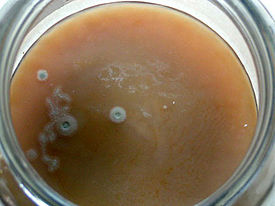All about kombucha tea
A fermented concoction made with tea, sugar, bacteria and yeasts might not sound like the most delicious or most beneficial drink, but some believe that is exactly what Kombucha tea is. Some have called it a “magical elixir”. Some have dubbed it the new Red Bull only with healthful properties. Some claim it can fight everything from baldness to AIDS. However, other sources cite adverse side effects of and deaths linked to the drink.
Kombucha tea is made by fermenting sweetened green or black tea with a culture of yeasts and bacteria called the “Kombucha mushroom,” according to Cancer.org. It is not actually a mushroom; rather, it is called that because of the shape and color of the sac that forms at the top of the tea after fermenting.
Kombucha tea is said to have originated in ancient China, but conflicting reports cite Russia and other countries as the first producing-nations.
“It’s become incredibly trendy lately in the 20-to-30-something, foodie, intelligentsia set” – Dr. Daphne Miller, a family practitioner and professor of nutrition and integrative medicine at the University of California, San Francisco, told The New York Times. “Kombucha is like their Coca-Cola.”
Kombucha tea is not justy popular amongst a small, healthfully-conscious sect. A-listers like Halle Berry, Madonna, Lindsay Lohan, Kirsten Dunst and Meg Ryan have all been spotted sipping the tea.
Since the 90′s when it first gained recognition as a cure-all for ailments for everything from cancer to graying hair, kombucha tea has continued to gain popularity despite minimal scientific validation and potential risks.
Now commercially available through a variety of national and regional distributors, including Whole Foods and Safeway, kombucha tea has become a hit among the proponents for holistic medicine, but why? Is it just a fad or does kombucha actually possess some type of miraculous healing power?
Also called Manchurian tea, kargasok tea, or tea fungus, kombucha is made at home and commercially by fermenting a flat pancake-like culture in sweetened black tea. Although the culture is actually made of a combination of yeast and bacteria, it is often referred to as the kombucha mushroom – according to an American Cancer Society statement about kombucha tea.
According to the Food and Drug Administration, the brewing process can take up to seven days and the nutritional profile and alcohol content can vary from batch to batch. This is especially common in a home-brew scenario where protocols are not followed and there are differences in the initial tea concentration, the age of the mushroom and fermentation time, which can affect the final product.
While there have been reports of tea contamination that have resulted in hospital trips and even lead poisoning when painted ceramic pots were used to brew the tea, these dangers seem to be far more prevalent in home brews rather than commercially available versions.
According to a FDA announcement concerning tea contamination – “FDA studies have found no evidence of contamination in kombucha products fermented under sterile conditions,” during inspections of a major kombucha tea supplier’s California facility.
Ed Kasper, a retired acupuncturist, better known for his online persona as the “Happy Herbalist,” has been brewing and selling the tea out of his North Carolina home since 1997. He compares brewing kombucha to cooking at home.
Kombucha tea has become exceedingly trendy lately amongst the healthfully conscious, and stars such as Lindsay Lohan and Madonna have even been spotted sipping on the tea. But is it really the magical cure-all it claims to be?
The beverage has been around for more than 2.000 years. In fact, the ancient Chinese called Kombucha the “Immortal Health Elixir.” Kombucha is a colony of bacteria and yeast, which is then added to sugar and tea and allowed to ferment in order to produce what is known as Kombucha tea. The tea is available commercially and can also be made at home.
Advocates of the brew claim that Kombucha detoxifies the body, increases energy, sharpens eyesight, aids joint recovery, improves skin elasticity, aids digestion and even prevents and fights cancer and arthritis. There is little published research done on the benefits.
As of yet there have not been any published case-controlled studies and no specific links have been established in relation to effect of central nervous system, liver, metabolic acidosis, and toxicity in general.
Several cases of harm have been reported, however, with symptoms including upset stomach, infections and allergic reactions. Some sources have even indirectly linked death to Kombucha.
Adverse reactions may be due to unsanitary fermentation conditions, leaching compounds from the fermentation vessels, or “sickly” kombucha cultures that cannot acidify the brew. The acidity of the fermented drink is what prevents the growth of unwanted contaminants.
Since home-brewing facilities vary a great deal, the tea can easily become contaminated with harmful germs. Home-brewed tea should not be brewed in ceramic, lead crystal or painted containers, as the acidity of the beverage can cause it to absorb harmful elements from the container.
All in all, there is no solid evidence that Kombucha delivers on its health claims, and given that several cases of harm have been reported, it might be best to avoid it until further research has been done. Since potential health risks are unknown, anyone with an immune deficiency or other medical condition should consult physician before drinking the tea. Women who are pregnant or breast feeding should also avoid Kombucha.
